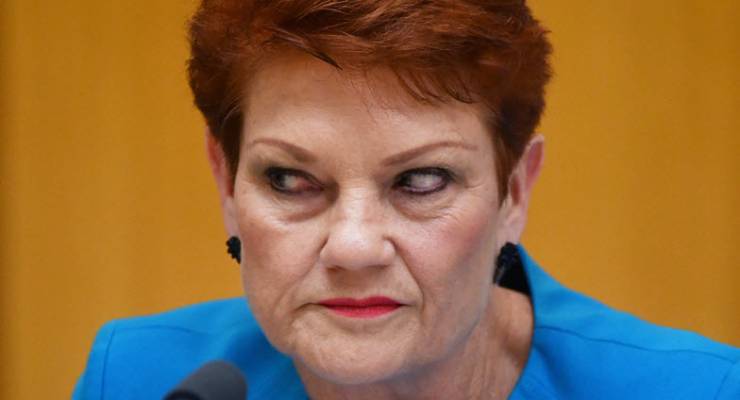
Pauline Hanson’s latest one notion of forcing a huge cut in the ABC’s appropriation as revenge for the national broadcaster revealing some unpleasant truths about her affairs is not a new idea. Once they’ve realised that the ABC’s editorial independence is protected by statute, aggrieved politicians have often turned to threatening the budget as a way to curb Aunty’s watchdog tendencies.
During the acrimonious 1975 “Dismissal” election, Malcolm Fraser complained often that he thought the ABC was being overly sympathetic to Whitlam and Labor, and far too critical of himself as the caretaker prime minister. At one point in the campaign, during the pre-recording of an interview with the late Richard Carleton for This Day Tonight, Fraser’s well-known temper got the better of him as he objected to a line of questioning and stopped the interview.
It was a tense moment in the studio as these two strong-willed men glared at each other with the videotape still rolling. Eventually the situation calmed. By mutual agreement, the aborted interview was erased and a replacement interview recorded. Minders for Fraser urged the attending press, who’d witnessed the standoff in the viewing gallery, not to report the incident, and they agreed to overlook this telling flash of anger from the Liberal leader.
A month later, before his first Parliament House press conference as the newly elected prime minister, Fraser’s staff handed out a sheet of dot-point summaries flagging the first executive actions of the incoming Coalition government. Among those announcements was a $250,000 cut to the current affairs budget of the ABC — a transparent act of revenge.
In the following days it was quietly pointed out to the PM’s office that it was not within the government’s power to direct a specific and immediate cut to any part of the ABC’s funding. The only sword of punishment available to aggrieved politicians is the annual appropriation, and that is the weak point at which One Nation is now threatening to strike.
There is much to be said for the British model of public broadcasting in which the amount of the BBC’s funding comes directly from the licence revenue raised, not by the whim of government. It has proved to be a very effective shield against political pressure. Australia also had a radio and TV licensing system, but after 1948 that income went into consolidated revenue and had no relation to the ABC’s funding. It was abolished more than 40 years ago — by the Whitlam government.







Four Corners should do her over again, as soon as the Queensland state election is announced.
Yeah, something else is bound to have surfaced by then.
The Wicked Witch of the North is already melting.
As long as all sides of politics complain about the ABC I’ll stay a happy tax payer. The more the right wing complain the happier I am, as they already have access to most of the media (of all persuasions) in this country to spout their opinions.
That’s why they hate the ABC – because there’s more at the ABC prone to treat them professionally – than the conservatives in operations owned and run by conservative media barons using their companies to pimp their politics.
I’m not sure the British model is so successful. Everyone I know over there is complaining that the BBC has gone completely right wing.
I would say the ABC is well on the way to going ‘completely right wing’. And that is without independent funding!!
I’d be interested what you base that statement on as most complaints about the ABC seem to come from the right.
Organisations such as News Corpse and IPA, to name just two, are OVER represented on most current affairs programs on TV.
It is even worse on radio…from local stations to Radio National. Take just one program as an example…RN Drive with Patricia Karvelas has the very occasional Labor politician interviewed, with night after night of right wing representatives from the LNP, along with lots of representatives from right wing groups/organisations. BORING!!
I agree its boring, but the ABC charter does say it has to be impartial. With the right in government together with right wing minor parties, its natural they’re going to be on the news, as tedious as it is sometimes. Its like democracy, not perfect but better than the alternative…
The licence fee in Britain is widely evaded even by those with TVs resulting in hundred of prosecutions every year.
How it can be reinstated in the 21stC when free-to-air TV is well on the way to becoming a stranded asset is as much a conundrum as how to make print pay.
To paraphrase, the caravan has barked and the dogs have moved on-line, DVD boxsets & just plain ignored.
I’d happily pay a tax levy if I thought that it would mean the ABC were not subject to political whim at each change of government but, oh look, Porcus Aviatrix!